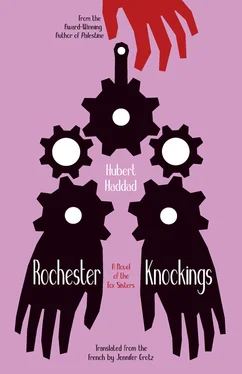Hubert Haddad
Rochester Knockings: A Novel of the Fox Sisters
In living memory of Élie Delamare-Deboutteville
Real or invented, all the facts and characters evoked in this novel belong to the domain of the imagination.
Some things are inescapable;
when they arrive, one must receive them.
— Jan Van Ruysbroeck
I.The Song of the Iroquois
The sun at dusk lit the staircase through the upstairs window. Seated on a step of unfinished wood, Kate studied the dust motes. They floated inside a shaft of light, one of the many suspended throughout the house. Fascinated, she held her breath. Each particle seemed to follow its own trajectory in the dancing company of its tiny neighbors, of which there were thousands, millions, more than the stars fixed or spinning through the moonless nights. Motionless, so as not to stir the air, Kate tried hard to distinguish a single mote among them with the idea of not losing sight of its capricious flight; the instant after it was no longer the same one, she had lost it forever and the archangelic spear of sunlight crossed painfully over her face, as if to ignite the pollen lining the bottom of her eyelids. She had gathered so many wildflowers that autumn morning to decorate the grave of her dog, Irondequoit, that nausea had clenched her throat and her whole body was still burning from it. And yet Mother had warned her.
There’s a creak of the staircase behind her and suddenly it’s dark: two freezing hands cover her eyes.
“Leave me alone,” said Kate. “I saw you. .”
“So now you’ve got eyes in the back of your head?” Margaret sat on a step just above her younger sister. Her torso blocked the ray of sun and its galactic swirls.
“You’re bothering me,” said Kate. “I was thinking of Irondequoit. .”
“Oh, Irondequoit, poor old thing! Don’t you worry, she’s gamboling through Dog Heaven. There’s no hell for animals, you know.”
“Hell? Do you really believe in that? Why would God exhaust himself by making the dead roast for all eternity? It would be enough to bury and forget them in the ground just the once.”
“Don’t you see, Katie, that’s completely impossible, even for God. Souls are immortal!”
The evening dwelled at length over Hydesville. First tinted blue like the pond’s surface in broad daylight, then almost black and wine-dark, shadows spread down to the bottom of the staircase and across the silhouette of the adolescent it slowly obscured. Already Kate couldn’t make out her sister’s face. Mica-like glimmers flickered between her teeth and on her pupils, giving her the look of a bear cub bewigged with thick black tresses. Straining to fix her attention on where her sister was sitting, Kate thought she was seeing a cruel mask lit from within and in an abrupt jump let out a small cry.
“What’s there?” sounded a frightened Margaret, half-turning back toward upstairs.
“Nothing, nothing, it’s just the darkness. .”
“You just made me weirdly afraid, as if you’d seen the devil in the exact spot where I’m sitting.”
Margaret considered her younger sister with perplexed irritation. She liked her well enough, her little Katie, she was so pretty and sometimes quite comical, but a compartment or two was missing somewhere in her brain. Kate certainly had brains to spare; even Leah, their older sister who had gone to live in Rochester, agreed; whatever her sustained distractions and funny airs might be, when she focused her cat’s eye into space, it betrayed something more than absent-mindedness, something entirely different, as if a part of her was dreaming while wide awake. At eleven years of age, not yet a woman, Katie had the look of an angel, one of “those gracious birds with a human face who populated in myriad the resplendent spheres,” as the reverend Henry Gascoigne described them one day in a Sunday sermon.
But suddenly everything was so peaceful. One could hear the faint and metallic sounds from the kitchen where their mother, barely recovered from an awful cold, bustled to prepare dinner. Outside, the cows were mooing in the meadows; the tethered horses fidgeted at the sound of an iron-wheeled stagecoach that passed by without even slowing on Long Road leading to Rochester. When the calm soon returned, the frequent bleating of the sheep and goats announced the return of Pequot, the nickname given to the idiot shepherd with his bright red face who terrified the girls of Hydesville with his postures and antics. Their father, also on his way back from the fields and pastures, was putting his tools back in the stable where he had just unsaddled Old Billy, as he did every night.
Knees tucked under her arms, for no apparent reason Kate burst into tears.
“What’s gotten into you?” her sister asked, astonished after their fearful laughter in the dark.
“It’s our little brother! I miss him so much.”
“He’s also in Heaven.”
“With Irondequoit, do you think?”
“Not far from her in any case — children would get bored surrounded by old people.”
“But we buried him right on top of grandfather in the cemetery.”
“Ssh! Skeletons have nothing to do with eternal life!”
Margaret grew quiet, thinking of their former life in another village in Monroe County. Even at fifteen years of age, when one is still dependent on them, adults nevertheless seem about as important as furniture. Maggie had had two precious friends there, soul mates, and even a pretend fiancé, the handsome Lee who frightened all the girls his own age — and then overnight, without warning, they’d decided to empty the house from basement to attic with the help of neighboring farmers, pile an entirety of memories into a big wagon, and that was the end of beautiful friendships and loves, despite promises to see each other again on the occasion of a parish festival or a rodeo. “Three moves equals a fire,” was a line from Benjamin Franklin that she had read in an old issue of Poor Richard’s Almanac dating back to her grandmother. There was a stack of them underneath the armoire in her parents’ bedroom. One move, at the age of fifteen, is as bad as all the griefs of love. Katie, on the other hand, seemed to have only a single regret, as violent as remorse: that they had abandoned their little brother there in his grave. Otherwise she appeared perfectly blasé, or else was hiding something in a virtuosic game of concealment.
But now there she was, turning and lifting a night owl’s vigilant stare up at her.
“Do you think of him sometimes, the landlord’s son?”
“Who are you talking about? Lee?” Margaret cried, shivering from head to toe, her gaze plunged into her younger sister’s eyes.
The glow from an oil lamp was flickering downstairs. Mother was arranging chairs around the table. They could hear the creaking of their father’s boots who, slightly drunk by this hour, was busy at the woodstove. The smell of lard soup floated up the staircase. Outside, the wolf and the owl were crying into the strong night wind that stirs the air and chases maladies away. It was the Song of the Iroquois that nighttime spirits have taken up from the depths of time. Kate could hear it distinctly through the walls of the wooden farmhouse.
We return thanks to the stars and the moon
That offer us their brightness after the sun’s departure
We return thanks to our ancestor He-no
For protecting our children from witches and snakes
And for having given us rain
Читать дальше












